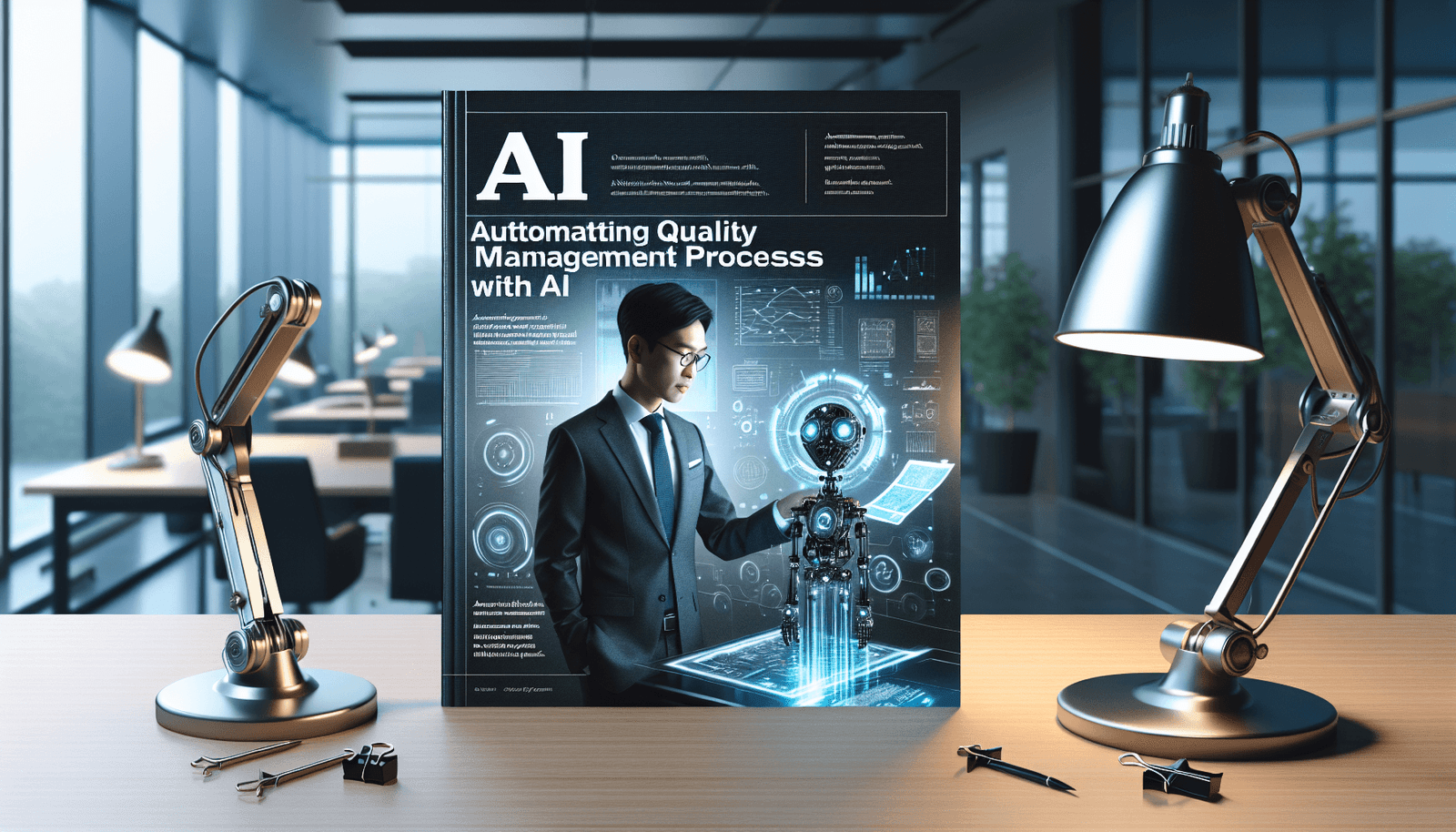Automating Quality Management Processes with AI
In today’s fast-paced industrial landscape, the integration of artificial intelligence (AI) into quality management processes is revolutionizing how organizations ensure product excellence. By utilizing AI-driven solutions, companies can enhance predictive quality control, enabling them to foresee potential defects before they arise. This proactive approach not only streamlines defect analysis but also improves overall operational efficiency. As AI continues to evolve, it presents an unprecedented opportunity for businesses to elevate their quality management strategies, ultimately leading to higher customer satisfaction and reduced costs. Discover how automating these processes with can transform your approach to quality management.
The Role of AI in Quality Management
AI is transforming the field of quality management in several key ways, each contributing to a more efficient, accurate, and proactive quality control process.
Automated Quality Monitoring
One of the primary benefits of Artificial Intelligence in quality management is the automation of quality monitoring and control processes. AI algorithms can continuously analyze data from various sources, such as manufacturing processes, quality control checkpoints, and customer feedback, to identify potential risks and ensure compliance with regulatory standards.
For instance, AI can monitor production lines in real-time, detecting anomalies and defects that might be overlooked by human inspectors. This continuous monitoring allows for immediate corrective actions, reducing the likelihood of defective products reaching the market.
Predictive Quality Analytics
Predictive quality analytics is another critical application of AI in quality management. By analyzing historical data and identifying patterns, AI algorithms can predict potential quality issues before they occur. This proactive approach enables organizations to implement preventive measures, minimizing disruptions and reducing costs[4].
How Predictive Quality Analytics Works
- Continuous Learning: AI systems continually refine their predictions as they learn from new data, leading to ongoing improvements in quality management processes.
- Real-Time Insights: Predictive analytics provide real-time insights, allowing organizations to address potential issues as soon as they are identified.
- Proactive Measures: By predicting quality issues, organizations can take proactive steps to prevent them, ensuring higher product quality and customer satisfaction.
Automated Quality Inspections
Automated quality inspections are a significant advancement in quality management, thanks to Artificial Intelligence. These inspections use AI-powered visual inspection systems integrated into the production line. High-resolution cameras and sensors capture detailed images of products, which are then analyzed by algorithms to identify any deviations or defects.
Benefits of Automated Quality Inspections
- Increased Accuracy: AI-powered inspection systems can detect defects with a higher level of accuracy than human inspectors, especially in high-speed production environments.
- Real-Time Feedback: Automated inspections provide immediate feedback, allowing production teams to address issues as they arise.
- Scalability: These systems can easily handle large volumes of products, making them ideal for industries with high production rates.
Enhanced Data Analysis
AI-infused quality management software collects and analyzes vast amounts of data from various sources, including production line metrics, customer feedback, and supply chain operations. This deep dive into analytics provides insights that would be humanly impossible to calculate otherwise, enabling organizations to optimize their operations, reduce waste, and tailor products to meet actual customer needs more effectively[3].
Areas of Enhanced Data Analysis
- Pattern Identification: AI can identify patterns and trends in data that may indicate potential quality issues or areas for improvement.
- Supply Chain Optimization: By analyzing data from the supply chain, Artificial Intelligence can help ensure the quality and timely delivery of raw materials, preventing disruptions.
- Customer Feedback: AI can analyze customer feedback to identify recurring issues and improve product quality accordingly.
Predictive Maintenance
Predictive maintenance is a powerful application in quality management. By analyzing data from sensors and equipment, AI algorithms can predict when a machine may fail or require maintenance. This foresight allows for scheduled maintenance at the most opportune time, avoiding unplanned downtime and extending the life of equipment[3][5].
Benefits of Predictive Maintenance
- Cost Savings: Predictive maintenance reduces the need for emergency repairs and minimizes production downtime.
- Operational Efficiency: By scheduling maintenance during less busy periods, organizations can optimize their operational efficiency.
- Equipment Longevity: Regular maintenance extends the life of equipment, reducing the need for frequent replacements.
Real-Time Quality Control
AI in quality control management software enables real-time monitoring, inspection, and adjustment of all processes. Unlike traditional quality control methods that occur at the end of the production process, Artificial Intelligence allows for quality checks at every point, ensuring products meet quality standards and regulatory requirements[3].
Real-Time Monitoring
- Immediate Corrections: Real-time feedback from Artificial Intelligence systems allows for immediate corrections, reducing defects and ensuring product quality.
- Continuous Improvement: Real-time monitoring enables continuous improvement, optimizing process effectiveness and preventing potential bottlenecks.
Integrating AI into Your QMS System
Integrating AI into your Quality Management System (QMS) requires careful planning and addressing potential challenges. Here are some strategies to consider:
Automated Compliance Management
AI can automate compliance management, ensuring that your operations meet international standards such as ISO 9001 without the need for manual work. AI’s predictive capabilities also help predict compliance issues before they arise[3].
Training and Employee Engagement
AI can create personalized training modules for different job functions, empowering workers with the right skills to contribute to quality management. This enhances employee engagement and compliance.
Best Practices for Implementation
- Data Quality: Ensure high-quality data to feed Artificial Intelligence algorithms for accurate insights.
- Employee Mindset: Educate employees on the benefits and use of Artificial Intelligence in quality management.
- Budgetary Considerations: Allocate appropriate resources for Artificial Intelligence implementation and maintenance.
- Continuous Improvement: Regularly update and refine Artificial Intelligence systems based on new data and feedback.
The Future of AI in QMS Systems
As technology continues to evolve, the future of Artificial Intelligence in QMS systems looks promising. Here are some predictions and how organizations can prepare:
Further Automation
AI will further automate processes, improve predictive analytics, and enable proactive quality management, preventing costly mistakes[1].
Talent Development
Organizations will focus on developing the right talent pool to successfully implement and manage AI-driven QMS systems[1].
Integration with Emerging Technologies
Future developments may include the integration of Artificial Intelligence with other emerging technologies like the Internet of Things (IoT) and blockchain to create more robust and transparent quality management systems[4].
Conclusion
The integration of AI into quality management processes is a game-changer for businesses aiming to enhance their product quality and operational efficiency. By automating quality monitoring, predictive quality analytics, automated quality inspections, and predictive maintenance, AI-driven solutions offer a proactive and efficient approach to quality management.
For more information on how AI can transform your quality management practices, visit Neyrotex.com.
Additional Resources
- For a deeper dive into the benefits of Artificial Intelligence in QMS, check out this article on Intellect.
By embracing AI technologies, businesses can significantly improve their quality management practices, drive operational efficiency, and achieve better customer satisfaction. For tailored solutions and expert advice, visit Neyrotex.com.







